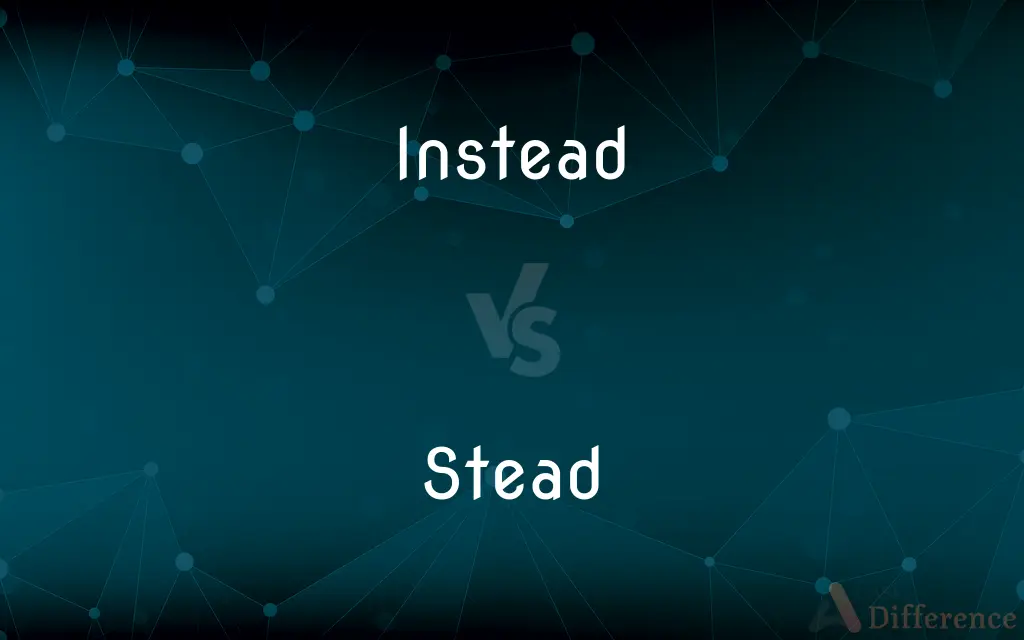Instead vs. Stead — What's the Difference?
By Fiza Rafique & Urooj Arif — Updated on April 3, 2024
Instead emphasizes substitution or choice, focusing on replacing one thing with another, while stead denotes a person's place or position in a specific context.

Difference Between Instead and Stead
Table of Contents
ADVERTISEMENT
Key Differences
Instead is commonly used to suggest an alternative or a replacement for something else, indicating a preference or choice between two possibilities. For example, one might say, "I'll have tea instead of coffee." Stead, on the other hand, is a somewhat archaic term that refers to the place, position, or role that someone or something should occupy or fulfill. It's often used in the phrase "in someone's stead," meaning to take someone's place or act on their behalf. For instance, "He attended the meeting in my stead,"
While instead is versatile and can be used in various contexts to denote preference or substitution, stead is more narrowly defined and typically used in more formal or specific situations. Instead can be applied in everyday language to express choices in food, activities, preferences, and more, making it broadly applicable. Stead, conversely, has a more specialized application, often implying a degree of representation or acting on behalf of another. Its usage conveys a sense of duty or responsibility that one person assumes for another, which is not inherently implied by instead.
Despite their differences, both terms serve to convey the concept of one entity taking the place of another, albeit in different contexts. Instead focuses more on the act of choosing between alternatives, while stead emphasizes the replacement of a person in a particular role or position.
Comparison Chart
Meaning
Denotes the choice of one thing over another as a substitute.
Refers to someone’s place or position.
Usage
Broad, applicable in various contexts for indicating alternatives.
Narrow, often formal, indicating representation or substitution in role.
ADVERTISEMENT
Example Context
Choosing between two options, like beverages or activities.
Taking someone’s role or position, often temporarily.
Connotation
Neutral, focused on preference or substitution.
Formal or archaic, emphasizing duty or representation.
Phrase
"instead of" is commonly used to introduce the alternative.
"in someone’s stead" denotes taking someone’s place.
Compare with Definitions
Instead
As a substitute or alternative to something else.
I chose to walk instead of taking the bus.
Stead
Refers to taking someone’s place or position.
He was appointed in the stead of the previous manager.
Instead
Used to suggest a preference in a choice between two things.
Would you like tea instead of coffee?
Stead
The place or role that someone or something should have.
She will perform the duties in my stead.
Instead
Indicates a replacement or substitution.
Use honey instead of sugar for a healthier option.
Stead
Used to indicate someone acting on behalf of another.
My assistant will attend in my stead.
Instead
Expresses a change in plans or preferences.
We're going to the museum instead of the park today.
Stead
Implies a substitution of persons, especially in roles or duties.
In your stead, I'll handle the negotiations.
Instead
Denotes an alternative action or choice.
He decided to study instead of going out with friends.
Stead
Denotes acting for or representing another.
The vice president will serve in the president's stead during the meeting.
Instead
In the place of something previously mentioned; as a substitute or an equivalent
Having planned to drive, we walked instead.
Stead
The place, position, or function properly or customarily occupied by another.
Instead
In preference; as an alternative
Yearned instead for a home and family.
Stead
Advantage; service; purpose
"His personal relationship with the electorate stands in good stead" (John Sears).
Instead
In the place of something (usually mentioned earlier); as a substitute or alternative.
I was going to go shopping, but I went dancing instead.
Stead
To be of advantage or service to; benefit.
Instead
In the place or room; - usually followed by of.
Let thistles grow of wheat.
Absalom made Amasa captain of the host instead of Joab.
Stead
(obsolete) A place, or spot, in general.
Instead
Equivalent; equal to; - usually with of.
This very consideration to a wise man is instead of a thousand arguments, to satisfy him, that in those times no such thing was believed.
Stead
(obsolete) A place where a person normally rests; a seat.
Instead
In place of, or as an alternative to;
Felix became a herpetologist instead
Alternatively we could buy a used car
Stead
(obsolete) An inhabited place; a settlement, city, town etc.
Instead
On the contrary;
Rather than disappoint the children, he did two quick tricks before he left
He didn't call; rather (or instead), he wrote her a letter
Used English terms instead of Latin ones
Stead
(obsolete) An estate, a property with its grounds; a farm; a homestead.
Stead
(obsolete) The frame on which a bed is laid; a bedstead.
Stead
The position or function (of someone or something), as taken on by a successor.
Stead
(figurative) An emotional or circumstantial "place" having specified advantages, qualities etc. (now only in phrases).
Stead
One's partner in a romantic relationship.
Stead
(obsolete) To help, support, benefit or assist; to be helpful.
Stead
(obsolete) To fill the stead or place of something.
Stead
Place, or spot, in general.
Fly, therefore, fly this fearful stead anon.
Stead
Place or room which another had, has, or might have.
In stead of bounds, he a pillar set.
Stead
A frame on which a bed is laid; a bedstead.
The genial bed,Sallow the feet, the borders, and the stead.
Stead
A farmhouse and offices.
The smallest act . . . shall stand us in great stead.
Here thy sword can do thee little stead.
Stead
To help; to support; to benefit; to assist.
Perhaps my succour or advisement meet,Mote stead you much your purpose to subdue.
It nothing steads usTo chide him from our eaves.
Stead
To fill the place of.
Stead
The function or position properly or customarily occupied or served by another;
Can you go in my stead?
Took his place
In lieu of
Common Curiosities
How do you use "instead" in a sentence?
You use "instead" to indicate a preference or substitution, e.g., "Let's have pasta instead of pizza tonight."
What does "instead" imply?
Instead implies choosing one thing over another as a substitution or alternative.
What is a common phrase using "instead"?
A common phrase is "instead of," used to introduce the alternative choice.
Can "stead" be used in everyday conversation?
While stead can be used in everyday conversation, it's more formal and less common than instead.
What does "in my stead" mean?
"In my stead" means taking someone’s place or fulfilling their role or duties.
What makes "instead" a versatile word?
Its ability to apply to various contexts and choices makes "instead" a versatile word.
Can "stead" imply responsibility?
Yes, stead often implies a degree of responsibility or duty when one takes another's place.
Is "instead" formal or informal?
Instead is neutral and can be used in both formal and informal contexts.
Is there a synonym for "stead"?
A synonym for stead could be "place" or "position," especially in a formal context.
What is the significance of "stead" in historical or legal contexts?
In historical or legal contexts, "stead" signifies formal representation or substitution, often with legal or ceremonial implications.
How is "instead" used to express a change of plans?
Instead is used to express a change of plans by indicating a new choice, e.g., "We'll watch a movie at home instead of going out."
Can "instead" indicate a temporary choice?
Yes, "instead" can indicate a temporary choice or preference between alternatives.
What kind of choices does "instead" apply to?
Instead applies to a wide range of choices, from simple daily preferences to significant life decisions.
Can "stead" only refer to people?
Primarily, yes, stead refers to people taking up roles or positions, though it can metaphorically extend to things in poetic or figurative language.
How does "stead" convey a sense of duty?
By implying representation or taking on someone's responsibilities, stead conveys a sense of duty.
Share Your Discovery

Previous Comparison
Succeeder vs. Successor
Next Comparison
Painting vs. SketchingAuthor Spotlight
Written by
Fiza RafiqueFiza Rafique is a skilled content writer at AskDifference.com, where she meticulously refines and enhances written pieces. Drawing from her vast editorial expertise, Fiza ensures clarity, accuracy, and precision in every article. Passionate about language, she continually seeks to elevate the quality of content for readers worldwide.
Co-written by
Urooj ArifUrooj is a skilled content writer at Ask Difference, known for her exceptional ability to simplify complex topics into engaging and informative content. With a passion for research and a flair for clear, concise writing, she consistently delivers articles that resonate with our diverse audience.














































